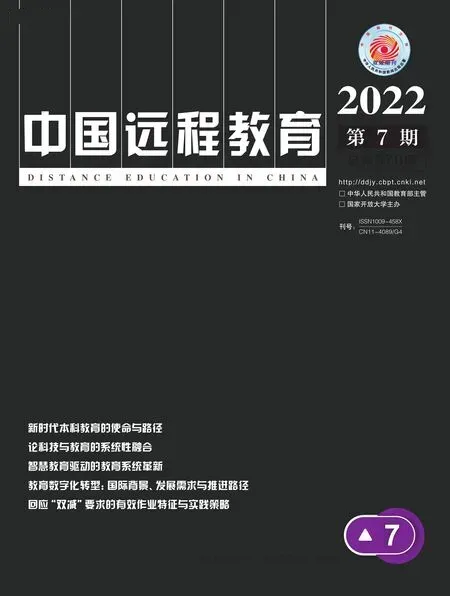英文摘要
Abstracts
Towards systematic integration of technology and education
Ronghuai Huang
We are now at the intersection of technological revolution and educational transformation, witnessing initial integration of technological advances and educational development. It is common sense that information technology has revolutionary impacts on education, which is demonstrated in the ethos of educational reform and development as well as in practice, resulting in technology-empowered education. This article identifies overall trends of the ongoing technological revolution, and analyzes the ethos, methods and predicament of educational reform and development. It is argued that the way technology transforms education is changing from the single dimension of technology-driven empowerment to four dimensions, i.e. social transformation, technology empowerment, educational change, and orderly progression of educational change. Comprehensive change in education depends on in-depth and orderly reform of various education scenarios while reform of different education scenarios requires coordinated progression to facilitate systematic change in education. Orderly progression and iterative development of the“demand-integration-evolution-governance”cycle in education scenarios enables integration of technology and education. Put specifically, identification of educational reform scenarios is a prerequisite of defining new demands for education in social transformation. Technology empowerment is the core value of the integration of intelligent technology into education. Social experiment and simulation is the important foundation of educational changing evolution and intervention. Smart society requires orderly progression of change in education systems through technology governance. The article comes to the conclusion that a new pattern is emerging in which technology and education are integrating systematically in all aspects, combining to shape the future ecology of education.
Keywords:future education; ecology of education; technological revolution; educational change; systematic integration; scenario identification; technology empowerment; technology governance
Smart education-driven innovation in education systems
Qintai Hu, Xiaofan Lin and Shuli Wang
Education systems are dynamic and complex with uncertainties. Currently, educational reforms tend to focus on issues within education systems without taking external factors into account, emphasize specific elements over interplay between various factors, lag behind the times, and fail to meet the needs of social development. Smart education supported by the new generation of technology and intelligent technology can provide effective solutions to these problems. This article explores the way smart education can solve problems related to innovation in education systems from an epistemological perspective. It then analyzes the set of goals of educational innovation. It is argued that smart education can revitalize and re-energize education systems, improve their adaptability and resilience, enable education systems to self-evolve, and contribute to their comprehensive reform. Goals of smart education-driven innovations are discussed and pathways proposed include change in the philosophy of education, multi-discipline intersection and integration, innovation in integrating information technology, teaching and learning space reshaped, digital and intelligent technology empowerment and synergy, construction of the ecology of public education provision, education governance updated, and establishment of a lifelong learning system.
Keywords:smart education; education system; innovation; intelligent technology; goal of education; education informatization; education digitalization; New Infrastructure of Education
Digital transformation of education: international perspective, development needs and implementation strategy
Di Wu, Huan Li and Xiaorong Yu
Digital transformation is the sine qua non of constructing a new ecology of education, easing the tension between demand and supply of talents and sustaining high-quality development of education. It has become a high-profile topic in the education community. This article makes a systematic analysis of major practices and effectiveness of digital transformation in education across the world and presents development of education informatization in China along with priorities at different historical stages. It then argues for the necessity of digitally transforming education in China in terms of enhancing educational quality, promoting educational equity, optimizing education governance and providing access to lifelong learning. Implantation strategies are also discussed.
Keywords:digital transformation of education; education informatization; educational equity; educational reform; education governance; strategic actions of education digitalization; New Infrastructure of Education;smart education
Assembling new toolboxes of methods and theories for innovative critical research on educational technology
Linda Castañeda and Ben Williamson
This article was initially conceived as the editorial of the special collection“Alternative paths in educational technology research: Innovative concepts and methods”that aimed to highlight fresh directions for specifically critical, complex, social scientific studies of educational technologies (edtech). As an introduction, the authors identify two main issues related to research about education and technology. First,recent research has begun examining powerful new actors, the expansion of scale and reach of technology, as well as the new technical capacities and human expertise that technologies demand. Second,this article highlights a series of innovative concepts, theories and methods that are appropriate to the critical study of the changing edtech landscape, pushing beyond studies of edtech effects to examine the dynamics and socio-material relations and assemblages through which edtech is produced and affects practices, institutions and systems. The article highlights the necessity of developing more complex,relational and nuanced approaches to critical edtech research that see it as inseparable from socially-embedded human practices, as well as intricately tangled up in social, economic, cultural, political and technical contexts. It calls for researchers to assemble new toolboxes of methods and theories for critical edtech research.
Keywords:edtech challenges; relational research; complex research; educational technology; research methods

